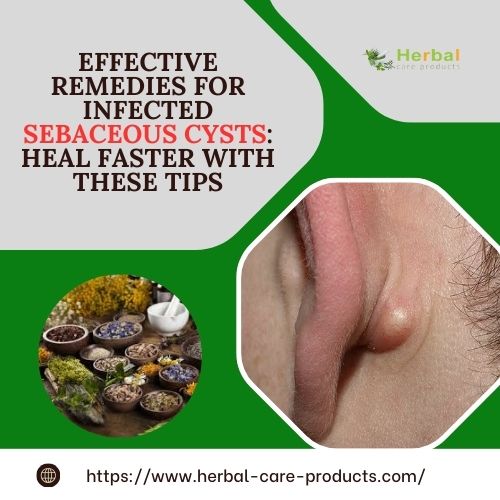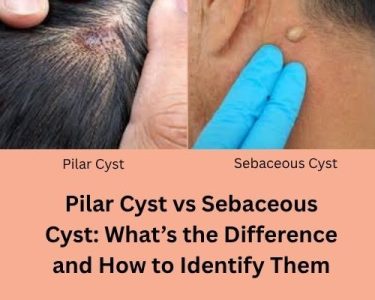Sebaceous cysts are common skin issues that form when the sebaceous glands, responsible for producing oil, become blocked. While most sebaceous cysts are harmless, they can become infected, leading to discomfort, swelling, and redness. Treating an infected sebaceous cyst promptly is crucial to prevent further complications. The most effective remedies for infected sebaceous cyst treatment and how supplements for sebaceous cyst can play a role in your healing journey.
Infected Sebaceous Cysts
An infected sebaceous cyst occurs when bacteria enter the blocked gland, leading to inflammation and pus formation. Symptoms include pain, warmth around the cyst, and a foul-smelling discharge. If left untreated, the infection can spread, requiring more invasive medical interventions.
Infected Sebaceous Cyst Home Treatment
Effective Remedies for Infected Sebaceous Cyst Treatment
- Warm Compresses
Applying a warm compress to the infected cyst can help reduce swelling and promote drainage. The warmth encourages the pus to move towards the surface, facilitating the healing process. To make a warm compress, soak a clean cloth in hot water, wring out the excess, and place it on the cyst for 10-15 minutes, several times a day. - Tea Tree Oil for Sebaceous Cyst
Tea tree oil is a popular natural remedy for managing sebaceous cysts due to its antibacterial and anti-inflammatory properties. Derived from the leaves of the Melaleuca alternifolia plant, tea tree oil can help reduce redness, swelling, and infection associated with sebaceous cysts. When applied topically, it penetrates the skin, helping to disinfect the area and soothe irritation. Its ability to combat bacteria may also prevent the cyst from becoming infected, promoting faster healing. However, it’s essential to dilute tea tree oil with a carrier oil, like coconut or olive oil, to prevent skin irritation.
Using tea tree oil as a treatment involves cleaning the affected area and applying the diluted oil directly onto the cyst with a cotton swab. This process can be repeated a few times a day to enhance its effectiveness. While tea tree oil can be a helpful natural remedy, it’s important to consult with a healthcare professional if the cyst persists, grows, or shows signs of severe infection. In some cases, medical intervention may be necessary to fully treat the cyst. - Turmeric Paste
Turmeric is a powerful anti-inflammatory and antibacterial agent. You can make a paste by mixing turmeric powder with water or honey and applying it directly to the infected cyst. Leave it on for 20 minutes before rinsing it off. Regular application can help reduce the infection and speed up healing. - Apple Cider Vinegar for Sebaceous Cyst
Apple cider vinegar (ACV) is often touted as a natural remedy for sebaceous cysts due to its antibacterial and anti-inflammatory properties. The acetic acid in ACV may help reduce inflammation and prevent bacterial infections, which can sometimes complicate cysts. Applying a diluted solution of apple cider vinegar directly to the cyst may help in breaking down the contents and promoting drainage. To use, soak a cotton ball in diluted ACV, apply it to the affected area, and secure it with a bandage for a few hours daily. However, it’s essential to dilute the vinegar properly to prevent skin irritation or burns.
While some people report positive results using apple cider vinegar for sebaceous cysts, scientific evidence supporting its effectiveness is limited. It is advisable to consult with a healthcare professional before trying this remedy, especially if the cyst is painful, infected, or growing. In some cases, medical intervention, such as drainage or surgical removal, may be necessary to completely resolve the issue. Additionally, ACV may not be suitable for everyone, particularly those with sensitive skin, so a patch test is recommended before full application. - Aloe Vera Gel
Aloe vera is known for its soothing and healing properties. Applying fresh aloe vera gel to the infected cyst can reduce pain, inflammation, and redness. It also promotes faster healing by keeping the area moisturized and preventing bacterial growth. - Over-the-Counter Antibiotic Ointments
For more severe infections, applying an over-the-counter antibiotic ointment may be necessary. These ointments can help kill bacteria and prevent the infection from spreading. Be sure to follow the instructions on the packaging and consult with a healthcare professional if the infection persists.
Supplements for Sebaceous Cyst: Supporting Your Skin Health
In addition to topical treatments, certain supplements can support your skin’s health and help prevent future cysts from forming:
- Zinc
Zinc is known for its anti-inflammatory and immune-boosting properties. Taking a zinc supplement can help reduce the risk of infections and promote faster healing of skin conditions, including sebaceous cysts. - Vitamin C
Vitamin C is essential for collagen production and skin repair. A daily supplement can strengthen your skin’s barrier, making it less susceptible to infections and promoting quicker healing. - Omega-3 Fatty Acids
Omega-3 fatty acids, found in fish oil supplements, have anti-inflammatory properties that can help reduce the size and discomfort of sebaceous cysts. Regular intake of omega-3s can also improve overall skin health. - Probiotics
A healthy gut contributes to healthy skin. Probiotic supplements help balance the gut flora, supporting your immune system and reducing the likelihood of skin infections. - Burdock Root
Burdock root is an herbal supplement known for its detoxifying properties. It helps cleanse the blood and may reduce the occurrence of sebaceous cysts by improving overall skin health.
When to Seek Medical Attention
While these remedies can be effective, it’s important to know when to seek medical attention. If the cyst continues to grow, becomes more painful, or shows signs of spreading infection, such as fever or chills, it’s crucial to consult a healthcare provider. They may prescribe oral antibiotics, drain the cyst, or recommend surgical removal.
Conclusion
Infected sebaceous cyst treatment involves a combination of home remedies and, in some cases, medical intervention. Incorporating supplements for sebaceous cyst into your routine can also support your skin’s health and reduce the risk of future infections. By taking a proactive approach, you can manage and heal infected sebaceous cysts effectively, ensuring a quicker recovery and healthier skin.




